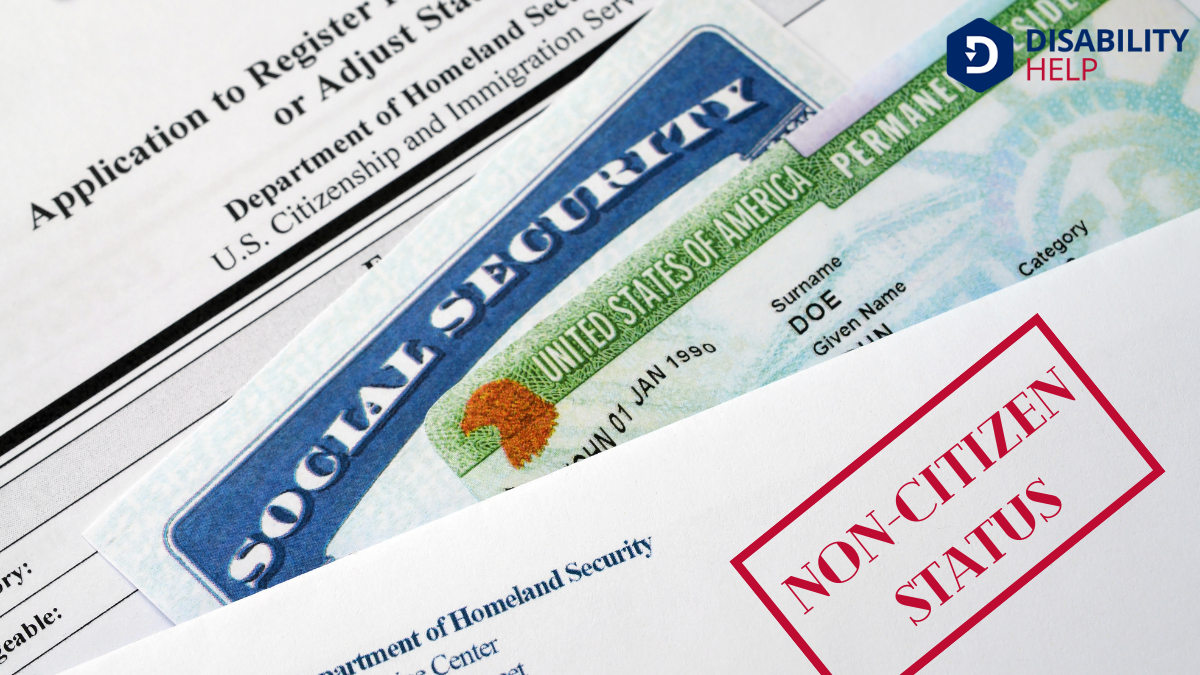When you're seeking Social Security Disability Insurance (SSDI)A U.S. government program that provides financial assistance to individuals who are unable to work d..., it's essential to understand the factors that might disqualify you. Having insufficient work credits or earning above the substantial gainful activity limit can jeopardize your eligibility. Additionally, lacking solid medical evidence or failing to follow prescribed treatments can also be problematic. Legal issues, such as incarceration, might impact your benefits. Curious about other disqualifiers and how to navigate them effectively?
Key Takeaways
- Insufficient work credits due to inadequate Social Security tax contributions disqualify individuals from SSDI.
- Earning above the Substantial Gainful Activity (SGA) limit may result in SSDI disqualification.
- Lack of solid medical evidence or non-compliance with prescribed treatments can jeopardize SSDI eligibility.
- Short-term disabilities or conditions not significantly limiting work abilities are generally non-qualifying for SSDI.
- Legal issues like felony incarceration or lack of U.S. legal presence can disqualify individuals from SSDI benefits.
Insufficient Work Credits
To qualify for Social Security Disability InsuranceA form of insurance that provides income to individuals who are unable to work due to a disability. (SSDI), you must have enough work credits, which are earned through paying Social Security taxes on your earnings.
If you haven’t accumulated the required number of credits, you won’t qualify for SSDI benefits. The number of credits you need depends on your age when you become disabled. Generally, you earn up to four credits each year by working and paying into Social Security.
You need at least 20 credits within the last 10 years if you're over 31. Younger individuals require fewer credits.
It’s essential to guarantee you’ve paid sufficient Social Security taxes during your working years to avoid disqualification. Check your Social Security Statement to see if you meet these requirements.
Earning Above the Substantial Gainful Activity Limit

If you're earning above the substantial gainful activity (SGA) limit, you mightn't qualify for SSDI benefits.
It's essential to understand how income thresholds impact your eligibility and what work activity restrictions apply.
However, there are exceptions for blind workers, allowing higher income limits without affecting their benefits.
Income Threshold Impact
While maneuvering through Social Security Disability Insurance (SSDI), understanding the income threshold impact is crucial. If your earnings exceed the Substantial Gainful Activity (SGA) limit set by Social Security, you might face disqualification.
For 2023, the SGA limit is $1,470 per month for non-blind individuals and $2,460 for blind individuals. Earning above these amounts can signal to Social Security that you can engage in significant work activities, possibly affecting your eligibility for benefits.
It's important to keep track of your earnings and any changes to these limits annually. By doing so, you guarantee your income stays within allowable boundaries, maintaining your SSDI benefits.
Work Activity Restrictions
Maneuvering SSDI means keeping an eye not only on income thresholds but also on how your work activities might affect your eligibility.
When you earn more than the Substantial Gainful Activity (SGA) limit, it can disqualify you from receiving SSDI benefits. The SGA is a monthly earnings cap set by the Social Security Administration.
If your income exceeds this limit due to work, you risk losing your SSDI benefits because it indicates you can engage in substantial work activities.
It's essential to monitor your earnings closely and report any changes to the SSA.
Stay informed about the current SGA limits, as they can change annually, and guarantee your work activities remain within acceptable boundaries to maintain your benefits.
Exceptions for Blind Workers
Blind workers have a unique advantage when it comes to SSDI benefits, as they can earn more than the standard Substantial Gainful Activity (SGA) limit without losing eligibility. This exception acknowledges the additional challenges blind individuals may face in the workforce.
Here’s what you need to know:
- Higher SGA Limit: As a blind worker, you can earn more per month than other SSDI recipients before your benefits are affected.
- Eligibility Criteria: You must meet the Social Security Administration's definition of statutory blindnessThe condition of having no vision or very limited visual perception..
- Annual Adjustment: The SGA limit for blind individuals is adjusted annually to reflect changes in national wages.
- Trial Work Period: You can test your ability to work for nine months without affecting your benefits, regardless of earning levels.
This guarantees greater financial stability while encouraging work participation.
Lack of Medical Evidence
When applying for Social Security Disability Insurance (SSDI), having solid medical evidence is vital for a successful claim. Without it, your application might face rejection. You need detailed documentation from healthcare professionals that clearly outlines your condition, its severity, and how it limits your ability to work.
Medical records, test results, and doctors' notes all play an important role in painting a complete picture of your disability. If the evidence is scant or inconsistent, SSA evaluators may doubt the legitimacy of your claim.
It's essential to guarantee that your healthcare providers thoroughly document your medical history and treatment. Don’t hesitate to gather thorough reports and regular updates from specialists. This documentation supports your case and increases the likelihood of approval for SSDI benefits.
Short-Term or Non-Severe Disabilities
If you're dealing with a temporary condition, Social Security Disability Insurance (SSDI) mightn't be the right fit, as it typically excludes short-term issues.
When it comes to minor impairments, the criteria focus on whether your condition considerably limits your ability to perform basic work activities.
Make sure your disability is both long-term and severe to meet SSDI requirements.
Temporary Conditions Exclusion
While seeking Social Security Disability Insurance (SSDI), it's essential to understand that temporary conditions typically don't qualify for benefits.
The Social Security Administration (SSA) requires that disabilities be long-term and greatly impact your ability to work. Temporary or short-term conditions generally don't meet these criteria.
Here are reasons why:
- Duration Requirement: Your condition must last at least 12 months or result in death.
- Work Impact: The condition should severely limit your ability to perform basic work activities.
- Medical Documentation: Robust, consistent medical evidence is necessary to support your claim.
- Recovery Expectation: If medical improvement is expected shortly, SSDI is unlikely to approve your application.
Understanding these factors can help you determine if applying for SSDI is the right step for your situation.
Minor Impairments Criteria
Though you might be dealing with a health issue, not all impairments qualify for SSDI, especially those considered minor or short-term. The Social Security Administration (SSA) defines minor impairments as those that don't greatly limit your ability to perform basic work activities.
If your condition is temporary or expected to improve within a year, it likely won't meet the criteria for SSDI benefits. For instance, a minor back strain or a short-term bout of anxiety may not qualify.
Additionally, if your impairmentA loss or abnormality of a body structure or function, whether physical, mental, or sensory, often a... doesn't impede daily activities or job performance greatly, it's deemed non-severe. To qualify, your condition must be severe enough to prevent substantial gainful activity.
Understanding these criteria can help you assess your eligibility for SSDI effectively.
Failure to Follow Prescribed Treatment

Neglecting to adhere to prescribed treatments can jeopardize your eligibility for Social Security Disability Insurance (SSDI). When you don't follow your doctor's recommendations, it may suggest you're not doing everything possible to improve your condition.
Here are some things to contemplate:
- Consistency: Verify you're consistently following medical advice. Missing appointments or medication can lead to questions about your commitment to recovery.
- Documentation: Keep records of all treatments and medications. This serves as proof of your efforts and compliance.
- Communication: Discuss any side effects or concerns with your doctor. They can adjust your treatment planA detailed plan developed by healthcare professionals to treat a specific health condition, outlinin... to better suit your needs.
- Reasonable Excuse: If you can't follow a treatment due to financial constraints or other valid reasons, communicate this clearly to the SSA.
Disability Caused by Substance Abuse
When it comes to SSDI, substance abuse can complicate your eligibility if it's the primary cause of your disability.
It may impact the medical evidence required to prove your case, as examiners need to determine if your condition would persist without substance use.
However, showing efforts in treatment and rehabilitationThe process of helping individuals with disabilities achieve and maintain their optimal physical, se... can positively influence your claim.
Substance Abuse and Eligibility
While applying for Social Security Disability Insurance (SSDI), it's important to understand how substance abuse might affect your eligibility. If substance abuse greatly contributes to your disability, it could disqualify you from receiving benefits. Here's what you need to take into account:
- Primary Cause: If your substance abuse is the main reason for your disabling condition, you may not qualify for SSDI. The Social Security Administration (SSA) will assess if your condition would still be disabling in the absence of substance abuse.
- Treatment Compliance: Demonstrating efforts to seek treatment and maintain sobriety can positively impact your case.
- Legal Issues: Frequent legal problems due to substance abuse might affect your credibility and eligibility.
- Medical Documentation: Detailed medical records are essential in establishing eligibility, showing the impact of your condition beyond substance abuse.
Impact on Medical Evidence
Understanding the role of substance abuse in your disability is vital, and it also extends to how medical evidence is evaluated. If substance abuse contributes markedly to your condition, Social Security will closely examine medical records to determine the impact.
They’ll assess if your disability would persist without drug or alcohol use. You need to provide clear evidence showing your condition is disabling regardless of substance involvement. Medical documentation, like doctors' notes and treatment histories, must reflect this.
If your records suggest that stopping substance abuse would improve your condition, it could affect your eligibility. It's important to confirm that your medical evidence clearly supports the persistence of your disability beyond any substance-related factors, strengthening your SSDI claim.
Treatment and Rehabilitation Efforts
Although maneuvering SSDI claims is complex, your efforts in treatment and rehabilitation are crucial when disability stems from substance abuse.
Demonstrating commitment to overcoming addiction can greatly impact your eligibility. Here’s what you need to focus on:
- Consistent Participation: Regularly attend rehab programs and therapy sessions. This shows you're serious about recovery.
- Document Progress: Keep records of your treatment progress, including therapist notes and program completion certificates. These are essential for your claim.
- Follow Medical Advice: Adhere to prescribed treatments and medications. Ignoring medical recommendations can hurt your case.
- Seek Support: Engage with support groups or counselors. This adds credibility to your commitment to improve.
Your proactive approach to treatment is key in establishing your eligibility despite the challenges of substance-related disabilities.
Criminal Convictions Impacting Benefits
Having a criminal conviction can greatly impact your eligibility for Social Security Disability Insurance (SSDI) benefits. If you're currently incarcerated due to a felony conviction, you won't receive SSDI payments during your imprisonment. However, your benefits can resume once you're released.
For those convicted of a felony but not incarcerated, your benefits might be affected if your disability arose or worsened because of the crime. It’s essential to know that while many factors influence SSDI eligibility, criminal history plays a significant role.
You should also understand that any outstanding warrants for arrest can complicate your ability to receive benefits. Always stay informed about how your legal history might affect your SSDI, and consider seeking professional guidance for clarity.
Non-Citizen Status

If you're a non-citizen, your eligibility for Social Security Disability Insurance (SSDI) is subject to specific conditions. You must meet certain requirements to qualify:
- Legal Presence: You need to be lawfully present in the U.S. This means having permission to reside or work in the country, such as a valid visa or green card.
- Work Credits: You must have sufficient work credits, which means you've paid into the Social Security system during your employment.
- Social Security Agreement: If your country has a totalization agreement with the U.S., your work credits from there may count.
- Residency Rules: Generally, you must reside in the U.S. to receive SSDI benefits, although there are exceptions.
Understanding these guidelines can help you navigate the SSDI process effectively.
Non-Compliance With SSA Requests
Maneuvering the SSDI process requires not only meeting eligibility criteria but also complying with requests from the Social Security Administration (SSA).
If you don’t follow through with their requests, you risk disqualification from receiving benefits. The SSA might ask for medical records, additional documentation, or clarification on your condition.
It’s essential to respond promptly and accurately to these requests to keep your claim moving forward. Ignoring or delaying responses can lead to a denial of benefits, even if you meet other eligibility requirements.
Returning to Work Too Soon
Jumping back into work too soon can jeopardize your eligibility for Social Security Disability Insurance (SSDI) benefits.
When you decide to return to work, it’s essential to understand how it impacts your SSDI status. Here’s what you should keep in mind:
- Trial Work Period: You’re allowed a trial work period where you can test your ability to work without losing benefits. Use this period wisely.
- Substantial Gainful Activity (SGA): If your earnings exceed a certain threshold, it could indicate you’re no longer disabled, affecting your benefits.
- Reporting Requirements: You must report your work activity to the SSA to avoid overpayments and potential penalties.
- Medical Improvement: Returning too soon might suggest your condition has improved, leading to a re-evaluation of your eligibility.
Understanding these factors helps maintain your SSDI benefits.
Conclusion
To secure SSDI benefits, you need to meet specific requirements and demonstrate your eligibility. If you lack enough work credits or earn above the substantial gainful activity limit, you might be disqualified. Make certain you provide solid medical evidence, follow prescribed treatments, and avoid any legal issues that could impact your benefits. Remember, short-term or minor disabilities don’t qualify, and non-compliance with SSA requests can hinder your claim. Stay informed and proactive to protect your benefits.






